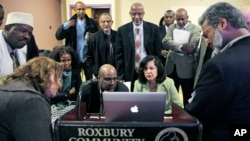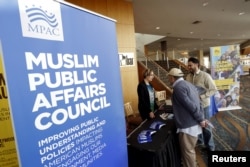Advocacy groups are turning away U.S. federal grants to combat extremism after reports that the Trump administration wants to focus its counterterrorism effort exclusively on Muslim radicals.
The Reuters news agency reported last week that the Department of Homeland Security planned to change its "Countering Violent Extremism" program to "Countering Islamic Extremism" or "Countering Radical Islamic Extremism" and no longer would target white supremacists and other violent groups.
In the final days of the Obama administration, the Homeland Security Department announced $10 million in grants to a diverse group of 31 nonprofit groups and state agencies to combat all manner of extremism, from Muslim extremists to neo-Nazis. Now, at least three of the grantees have responded to the planned revamping and the Trump administration's perceived anti-Muslim policies by rejecting the money.
Forgoing grants
Ka Joog, a Somali-American youth organization in Minneapolis; Leaders Advancing and Helping Communities, a nonprofit that works in Dearborn, Mich.; and Unity Productions Foundation in Virginia have all spurned their grants. Several others are reviewing their offers, while other grantees such as the Muslim Public Affairs Council are taking a wait-and-see approach.
Hoda Hawa, MPAC's director of policy and advocacy, said she'd heard from congressional staffers and government officials that Trump was considering renaming the CVE program through an executive order.
"We'd vigorously oppose such a program, and in fact, we'll be working on multiple fronts, including legislative and legal, to stop its creation and implementation," Hoda said.
Another nonprofit official said he'd received conflicting information about the reported change, with some officials "reassuring" his organization that no renaming was in the works.
A Homeland Security spokesman declined to comment on the report. White House spokesman Sean Spicer said he did not have information about it, but he said at a White House briefing February 3 that it would not be a surprise that "rooting out radical Islamic terrorism" is a major focus of the Trump administration.
With its neutral name, the Countering Violent Extremism initiative, launched in 2015, ostensibly sought to combat all violent ideologies, but Muslim critics felt their community of 3.3 million was its real target.
Controversy abounds
Regardless of whether the administration renames the program, experts say the new White House's growing focus on "radical Islamic terrorism" to the exclusion of other extremists is troubling to many.
"The threat today is so diffuse that tomorrow we could have an intermediate or mass casualty event across a spectrum of ideologies of which violent Salafist jihadists are but one," said Brian Levin, director of the Center for the Study of Hate and Extremism at California State University at San Bernardino.
The Department of Homeland Security has said the threat of violent extremism has evolved in recent years, with individuals inspired by the Islamic State terrorist group and al-Qaida posing the "most immediate threat." However, research indicates the level of Muslim involvement in violent extremism in the United States remains relatively low.
According to the National Consortium for the Study of Terrorism and Responses to Terrorism, since the attacks of September 2001, far-right extremists have carried out 89 attacks, causing 158 deaths, while Muslim extremists have been responsible for 41 acts of terror, killing 119 people. Levin's data, however, show that "Salafist jihadists" killed a larger number than far-right extremists.
Adnan Kifayat, a senior fellow at the German Marshall Fund in Washington, a public policy and grant-making group, said refocusing the program exclusively on Islamic extremism would make it more difficult for Muslims to cooperate with government counterterrorism efforts.
"My sense is that, unfortunately, the Trump administration will only be focused on radical Islam and Middle East-based terrorist organizations and that the administration will continue to associate countering violent extremism with an entire religion, if not an entire region of the world," said Kifayat, who is also head of global security ventures at the Gen Next Foundation, a "venture philanthropy" group that works to create opportunities and confront challenges in education, economic opportunity and global security.
"I think we need to invest far more in these programs," Kifayat added. "What we cannot do is have the administration talk about countering violent extremism and then come the kind of executive orders that are simply not going to solve the problems."
Constitutional questions
Other critics of renaming the program say it could run afoul of the Constitution.
"Insofar as the administration is singling out Islam as the root of terrorism, one could argue a violation of the First Amendment's Establishment Clause because it disfavors one faith tradition and group in contrast to others," said Engy Abdelkader, an adjunct professor of law at Georgetown University in Washington.
"Policies and tactics that single out innocent Americans on account of their faith practices may also trigger the First Amendment's Free Exercise Clause," Abdelkader said.
But John Banzhaf, a professor of law at George Washington University in Washington, said the government enjoys broad authority to choose counterterrorism targets and methods. As long as federal agencies can show a "compelling public interest," they can use religion or race as a factor in conducting counterterrorism.
"Undoubtedly someone will try to raise legal objections to it, but I think overall it would be constitutional, it would be legal," Banzhaf said of the reported plan to rename the Countering Violent Extremism initiative.
Rather than excluding other groups from the program, Banzhaf suggested splitting it up into parts that focus on different strands of extremism.
"Each of these is different enough that you'll probably want to have a different program, and this will make people feel a lot better because it's not as if you're abandoning all the others," he said.







